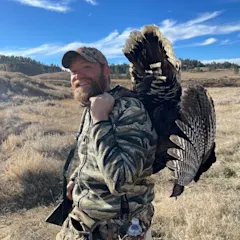Just before midnight on May 7, members of the House of Representatives Natural Resource Committee added an amendment to a sprawling budget bill that would have forced the sale or transfer of some 540,000 acres of public land in Utah and Nevada. The provision caused an uproar among public land advocates who said it would clear a path for more public land sell-offs during future budget negotiations. Now, it appears to have been stripped out of the so-called “Big Beautiful Budget Bill” during another marathon debate—this time in the House Rules Committee.
A slew of brands and conservation groups in the hunting and fishing industry spoke out after the amendment made headlines on May 7, with everyone from the Theodore Roosevelt Conservation Partnership (TRCP) to the Congressional Sportsmens Foundation (CSF) expressing opposition. Opponents said the sell-off would have bypassed public input and diverted money from public land sales away from conservation efforts.
“From mule deer and pronghorn on Bureau of Land Management (BLM) lands in the West to wild turkeys and trout on U.S. Forest Service (USFS) lands in the east, for many of us, America’s federal public lands are the bedrock of our access to our sporting traditions,” wrote CSF in a statement issued on May 15. “When efforts to sell or dispose of federal lands are unexpectedly added to a piece of legislation that requires a lower degree of Congressional passage than normal legislation, it causes concern.”
Both TRCP and CSF said that public land disposal can be appropriate at times. But there are established procedures for land sales and transfers that don’t involve fly-by-night budget maneuvering in Congress. “The TRCP is encouraged to see provisions removed from the House budget reconciliation bill that would sell off public lands,” said TRCP president and CEO Joel Pedersen in a press release. “Hunters and anglers stepped into the arena to make their voices heard, and members of Congress listened—thank you.”
Madeline West is TRCP's Vice President of Western Conservation. She said the amendment would have circumvented long-established policy laws. "This says that the money from the sale of our public lands would go into the US Treasury," West told F&S shortly after the amendment was added. "But in the Federal Land Transaction Facilitation Act (FLTFA), there is a clear administrative process that says the proceeds from federal land sales must go into an account that reinvests in our public land system. Instead of being used for the budget, money from the sale of public land is supposed to improve existing public lands or provide additional or expanded public land access."
There was widespread uncertainty around the total number of acres that the amendment targeted from the start. Original reports put the number around 11,000 acres, but that quickly grew to a half-million as more policy experts dug into specifics. Then, in the hours before the provision was stripped, GPS mapping company OnX released and publicized a report that would have tripled the original estimates. OnX has since retracted that report, however, saying their geospatial analysis team misinterpreted the language in the amendment. "In reality, the number is much closer to the original estimate and comes in at 547,678," an OnX spokesman told F&S.
News that the sell-off amendment was stripped first broke when Montana Rep. Ryan Zinke told Beltway-based reporters that it wouldn't be included in an updated version of the bill known as the Manager's Amendment. Zinke, who served as the Secretary of the Interior during the first Trump Administration, has called public land sales a "red line" that he's unwilling to cross. He was one of several western Republicans in the House who opposed the sell-off provision.
Many conservationists still worry about impacts of the House's new budget package, even after the public land sell-offs were stripped away. Most notably because it would eliminate a mining moratorium for areas around Minnesota's Boundary Waters Canoe Area Wilderness, expedite drilling in the Arctic National Wildlife Refuge (ANWR), and strip more funding from agencies in charge of wildlife conservation and land management—like USFS and NOAA.
Read Next: New Military Base Will Shutter Over 100,000 Acres of Public Hunting Access in New Mexico
Now that the House version of the budget has passed a floor vote, negotiations will move to the Senate. For now, conservation groups are celebrating the amendment's removal as a win not just for hunters and anglers who currently utilize public lands, but for future generations. "This is a landmark moment for Backcountry Hunters & Anglers and every American who values our nation’s public lands legacy," said Patrick Berry, BHA President and CEO. "When the BHA community shows up, speaks out, and takes action, we prove we can defy the odds and stop bad ideas before they become bad law."


